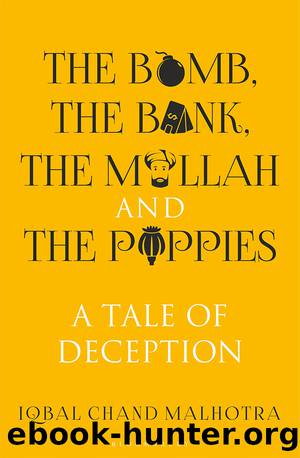The Bomb, the Bank, the Mullah and the Poppies A Tale of Deception by Iqbal Chand Malhotra

Author:Iqbal Chand Malhotra
Language: eng
Format: epub
Publisher: Bloomsbury Publishing India Pvt. Ltd.
Published: 2023-08-19T00:00:00+00:00
11
The Bomb Is Born by Caesarean
1997â1999
Within weeks of the start of President Bill Clintonâs second term in January 1997, Nawaz Sharif also returned to power in Pakistan on 4 February 1997. But the people of Pakistan had grown tired of the militaryâs version of democracy and largely abstained from voting. Sharif immediately revoked the 8th Amendment to Pakistanâs Constitution, ridding himself of the threat of dismissal by President Leghari. He planned to take on all the contestants who would challenge him and merrily set off on a collision course with both the US and his own army.
In February 1997, the Talibanâs move into Ghorband Valley, which lies adjacent to Massoudâs stronghold of Panjshir Valley, came after local commanders switched sides. This weakened Massoud and the Shia forces of Hizb-e-Wahdat located near the Shiber Pass. In their push through Chorband Valley a month later, the Taliban were able to split the Hizb-e-Wahdat by getting two key commanders to defect, allowing it an open route towards Mazar-e-Sharif. These two key commanders had belonged to a faction of the Hizb-e-Wahdat led by Haji Diljo, with whom the Taliban had nearly clinched an accord in July 1997 in Maidan Shahar. Azizullah and Ghafoor, two commanders from Ghorband Valley who belonged to Massoud, defected during the same period, weakening the Northern Alliance.
The father-and-son Noorzai duo, who derived their strength from a dominant position in Afghanistanâs lucrative poppy trade, were not the only benefactors of the Taliban for long. The Taliban conquered district after district in Kandahar, soon attracting other tribal chiefs with opium trade ties. As their reputation for providing security in the war-torn Afghan countryside spread, so did their ability to capture towns without a shot. In many communities, they were welcomed as protectors. In areas where the new movementâs moral and religious standing failed to carry the day, generous disbursements of cash usually succeeded.1
The ISI handed out bribes to regional strongmen as their fighters advanced through Kabul. Several key tribes joined the movement simply because Mullah Omar made deals not to crack down on poppy, according to a November 1996 DEA document.2 Supporting the poppy trade not only secured the Taliban financial backing, but it also won them political support from the tribes and the general public, particularly in regions where there were few other viable professions. In 1997, heroin-processing refineries continued to operate without interference in areas directly under Taliban control in Kandahar, Helmand and Nimroz despite an earlier Taliban decree outlawing the processing of heroin. In 1997, an Australian Federal Police liaison officer in Islamabad found that the Taliban issued official government licences permitting the cultivation of poppy and the production of opium, an indication the Taliban attempted to regulate the industry3 and milk it as well. According to numerous farmers in southern Afghanistan, a year prior to the Australian Federal Police findings, the Taliban distributed fertiliser to help enhance the poppy crop and increase its opium output. The Taliban collected tax on the cultivation of poppy and also on the
Download
This site does not store any files on its server. We only index and link to content provided by other sites. Please contact the content providers to delete copyright contents if any and email us, we'll remove relevant links or contents immediately.
The Bomb, the Bank, the Mullah and the Poppies A Tale of Deception by Iqbal Chand Malhotra(188)
The Political Animal by Jeremy Paxman(186)
The Destiny of Civilization: Finance Capitalism, Industrial Capitalism or Socialism by Michael Hudson(180)
A Secret Order: Investigating the High Strangeness and Synchronicity in the JFK Assassination by H.P. Albarelli(168)
Secret Freedom Fighter: Fighting Tyranny Without Terrorizing The Innocent by Jefferson Mack(163)
Holtsclaw by H. D. Jacobsen(162)
Everything You Really Need to Know About Politics: My Life as an MP by Phillips Jess(162)
Chariots of the Desert by The Story of Israeli Armoured Corps(161)
West Asia At War by Talmiz Ahmad(154)
January 2024 by Le Monde diplomatique(137)
The Law of War and Peace by unknow(135)
America Invulnerable. The Quest for Absolute Security from 1812 to Star Wars by James Chace Caleb Carr(135)
Germany and Two World Wars by Egon Harings(133)
The First Dissident by William Safire(131)
Towards a Socially Sustainable World Economy : An Analysis of the Social Pillars of Globalization by Raymond Torres(124)
Israel in the mind of America by Grose Peter 1934-(118)
Napolitano 3 in 1 by Andrew Napolitano(115)
The Palgrave Handbook of Global Politics in the 22nd Century by Unknown(114)
Potent natural egg-laying stimulant for cabbage butterfly <Emphasis Type="Italic">Pieris rapae <Emphasis> by Unknown(111)
